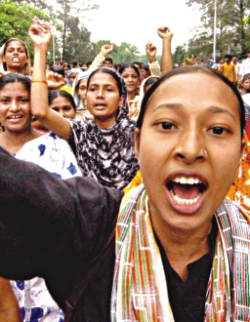Reflections
Promises forgotten
Shamim Ahsan
After a few days pause labour unrest resurfaced in the Savar Export Processing Zone on May 31, much to the surprise of many garment related people. The first round of violence lasting three days from May 22 that saw one killed and several hundred injured, apparently subsided in the last week of the month, inspiring sighs of relief from many garment owners. So they were stunned when workers once again took to the street sparking the second round of mayhem in less than two weeks. By June 4 things once again began to improve, but many are apprehending that the third round may not be far away.
 Unless, of course, the basic problems of workers are immediately taken care of. The stories of exploitation and grievances of the garment workers are as old as the history of the garment industry of the country. Over the last 20 years or so garment workers have fought with their owners time and again, though in a very limited way and more often those were confined to a particular factory. And every time they were quelled by either wholesale dismissals or empty promises. The May 22-May 24 violent upsurge of the garment workers in and around Dhaka EPZ area was much larger both in size and effect that saw some one hundred factories across Gazipur, Savar and Mirpur areas vandalised. The government and BGMEA leaders were quick to respond to the workers demand and in a tripartite meeting on May 24 the owners association accepted the workers demands including issuance of official appointment letter, increasing minimum salary, payment of arrears, granting weekly holiday and allowing trade union rights. Unless, of course, the basic problems of workers are immediately taken care of. The stories of exploitation and grievances of the garment workers are as old as the history of the garment industry of the country. Over the last 20 years or so garment workers have fought with their owners time and again, though in a very limited way and more often those were confined to a particular factory. And every time they were quelled by either wholesale dismissals or empty promises. The May 22-May 24 violent upsurge of the garment workers in and around Dhaka EPZ area was much larger both in size and effect that saw some one hundred factories across Gazipur, Savar and Mirpur areas vandalised. The government and BGMEA leaders were quick to respond to the workers demand and in a tripartite meeting on May 24 the owners association accepted the workers demands including issuance of official appointment letter, increasing minimum salary, payment of arrears, granting weekly holiday and allowing trade union rights.
One expected that the garment owners as well as the BGMEA would be much more sensitive and sincere to their workers grievances after the three-day long anarchy. But, that was not to be. So, on May 31 when workers of A-One factory in EPZ demanded pay hike and payment of arrears the garment authority misbehaved with them. The workers who were soon joined by peers from three other neighbouring factories started work stoppage. They also reportedly attacked a number of garment factories, triggering a retaliation from the owner's henchmen. Very soon the entire EPZ area turned into a virtual battleground with dozens suffering injuries. Hundreds of policemen and Rab members toiled all day to appease the feuding sides.
Over the next days there was no letting up in the violent movement and on June 4 the foreign investors decided to close down all the 92 factories inside EPZ. Chairman of Bangladesh Export Processing Zone Investors Association (Bepzia) Kihak Sung in a furious reaction all the way from South Korea threatened they would not re-open the factories until the government provide them with full proof security. Prime Minister Khaleda Zia, who is not exactly famous for quickly responding to a situation, called five of her ministers to work out the government's role. Four officials of DEPZ including the chairman were shown the door. Maj Hafizuddin who was given the additional charge of commerce ministry along with Water Resources, emphatically charged "an identified quarter" of orchestrating these vandalism just prior to elections.
Significantly, Kihak Sung also harped on the "sabotage theory" that both BGMEA and the government have been tirelessly trying to establish. That it was the garment workers who have been agitating and in cases even resorting to rampage is something the BGMEA and the government and now Bepzia won't simply admit. "These people are outsiders. They trespassed into the zone in plain clothes and lungis, which are not workers uniform," Sung said.
But workers apparently have a different story to tell. Bangladesh Garments Sramik Trade Union Kendra President Edris Ali said many of the garment factories remained open on Friday even after the May 24 tripartite meeting that unanimously decided to give weekly holiday.
There are also other promises to keep. Ali said the minimum wage for a garment worker was set Tk 930 per month back in 1994 and over the last 12 years the minimum salary was not raised. Again, though salary and work environment in the factories in EPZ are comparatively better the behaviour of the factory authority, specially the mid-level officials, is extremely bad, alleged Ali.
On June 5 BGMEA finally did what it should have done long ago. At a discussion with the press its President Tipu Munshi said they have agreed on most of the basic demands of the workers that include a weekly holiday, maternity leave, trade union rights as well as re-fixing the minimum wage within three months. One hopes this time they will keep their promises.
Copyright (R) thedailystar.net 2006 |
